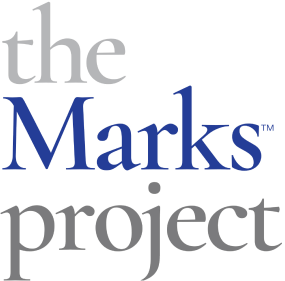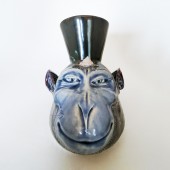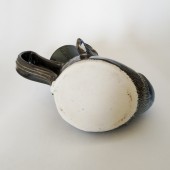![]() Printer version
Printer version
Joe Bova
1941 Born Houston, Texas
EDUCATION
1967 BFA University of Houston, Houston, Texas
1969 MA University of New Mexico, Albuquerque, New Mexico
PRIMARY WORK EXPERIENCE
1960-1964 United States Air Force
1969-1971 Assistant Professor of Art, Nichols State University, Thibodaux, Louisiana
1971-1990 Professor of Art (Emeritus), Louisiana State University, Baton Rouge, Louisiana
1990-1997 Director, School of Art, Ohio University, Athens, Ohio
1997-2006 Professor, School of Art, Ohio University, Athens, Ohio
2006-2007 Director, School of Art, Ohio University, Athens, Ohio
2014-2015 Visiting Professor, Florida Atlantic University, Boca Raton, Florida
2016 Visiting Professor, William and Mary University, Williamsburg, Virginia
RESIDENCIES
1996 Artist-in-Residence, Watershed Center for the Ceramic Arts, Edgecombe, Maine
2000 Artist-in-Residence, Rhode Island School of Design, Providence, Rhode Island
2004 Artist-in-Residence Fellowship, NCECA | International Ceramics Studio, Kecskemet, Hungary
2008 Lewallen Resident Artist Fellowship, Santa Fe Preparatory High School, Santa Fe, New Mexico
2016 Class of 1936 Artist in Residence, William and Mary University, Williamsburg, Virginia
BIOGRAPHY
Joe Bova is a sculptor known for his figurative sculpture and vessels which incorporate human and animal imagry with anthropomorphic expression. Common animal subjects are birds, dogs, monkeys, pigs, and rabbits. Forms vary from face jugs to jars, sculptures both on plinths and wall hung.
Bova’s developed sculptural works many of which show the seamless integration of the animal forms and vessel. During different periods of his career, work has dealt with social and political topics. Bova utilizes the animal form as ‘symbols, surrogates and totems’. He is influenced by the ceramics of Mexico and of the Mochica peoples of the northern coast of Peru which is known for jars in the form of the human head with stylized motifs. The Mochia influence is seen some examples of Bova’s work of the late 1970s through the 1980s. In 2006 Bova, began to create a focus on animal forms and imagery and the teapot form, Bova describes these as ‘the pot incognito’. At times, Bova incorporates the human and animal forms. In certain cases eroticism and humor are used to develop content.
Bova Says of his work, “Using animal imagery was first inspired by early the realities of hunting and fishing, and later by their power as symbols, surrogates and totems. For much of my career I have been making social and political commentary art, often also involving eroticism. In 2006-07, seeking a respite from the polemical, I returned to the earlier and abiding interest in animal forms and imagery with a new interest in integrating the vessel, namely the teapot, with the figure. The pot incognito, you might say.”
Throughout his career, Bova remained an influential teacher.
PUBLIC COLLECTIONS
Arizona State University Art Museum, Tempe, Arizona
Broussard Memorial Art Galleries, Old State Capitol, Baton Rouge, Louisiana
Crocker Art Museum, Sacramento, California
Greenville Museum of Art, Greenville, South Carolina
International Ceramics Studio, Kecskemet, Hungary
Irish National Collection, Dublin, Ireland
Lamar Dodd Art Center, La Grange, Georgia
Los Angeles County Museum of Art, Los Angeles, California
Loyola University, The Loyola Collection, New Orleans, Louisiana
Mint Museum, Charlotte, North Carolina
San Angelo Museum of Art, San Angelo, Texas
St. George Roman Catholic Church, Baton Rouge, Louisiana
State of Louisiana, Baton Rouge, Louisiana
State of Tennessee, Nashville, Tennessee
University of New Mexico, Albuquerque, New Mexico
BIBLIOGRAPHY
Ceramics Southeast 1984. Visual Arts Gallery, Athens, GA: University of Georgia, 1984.
Levin, Elaine. The History of American Ceramics: From Pipkins and Bean Pots to Contemporary Forms, 1607 to the Present. New York, NY: Harry N. Abrams Publishing, 1988.
Lynn, Martha Drexler. American Studio Ceramics: Innovation and Identity, 1940 to 1979. New Haven, CT: Yale University Press, 2015.
Morgenthal, Deborah, and Suzanne J. E. Tourtillott. The Penland Book of Ceramics: Masterclasses in Ceramic Techniques. New York, NY: Lark Books, 2003.
Tourtillott, Suzanne J. E. 500 Animals in Clay: Contemporary Expressions of the Animal Form. Juried by Joe Bova. New York, NY: Sterling Publishing Company, 2006.
Citation: "The Marks Project." Last modified August 6, 2023. http://www.themarksproject.org:443/marks/bova





